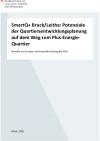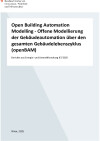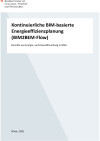Suchergebnisse
VR4UrbanDev - Virtual Reality as an innovative, digital tool for the integrative urban development of the future
Virtual reality (VR) has the potential to make complex issues more quickly comprehensible and directly tangible. In the VR4UrbanDev project, we are using this potential for energy planning processes for buildings and urban districts. On the basis of test areas, we develop methods for importing and visualising energy-related real-time data and simulation data in the VR environment.
see-it - Kamerabasiertes, nutzerzentriertes Tageslicht-Steuerungssystem für optimale Arbeitsumgebungen
Im Projekt "see-it" werden Technologien im Bereich Hochbau und Building Automation für Qualitäts- und Performanceverbesserungen am Arbeitsplatz erforscht. Ziel ist die Individualisierung der Steuerung des Sonnenschutzes auf die vor Blendung und Überhitzung zu schützenden und auf Durchsicht hoffenden Personen.
SURO - Der städtische Untergrund als Rohstoffmine? Potential an Sekundärressourcen in der erdverlegten Infrastruktur
Machbarkeit eines Ressourcenkatasters zur Inventarisierung, Charakterisierung und Verortung der Materialbestände in den erdverlegten Infrastrukturnetzwerken österreichischer Stadtregionen. Das Ergebnis dient der ökonomischen Bewertung von Sekundärrohstoffpotenzialen.
EDEN - Entwicklung einer strukturierten und fehlerminimierten Datenaufbereitung und Dokumentation für Energieausweise
Aufgrund der Mängel von ausgestellten Energieausweisen, widmete sich das Projekt der Problematik über die Entwicklung einer standardisierten und leicht verwendbaren, generischen Eingabedatendokumentation, welche für alle Stakeholder erhöhte Rechtssicherheit und reduzierte Unsicherheit bedeuten würde. In der Sondierung wurde die Entwicklung einer solchen Dokumentation anhand eines repräsentativ auszuwählenden Gebäudesample durchexerziert und das Potential einer solchen Entwicklung diskutiert.
Urban Area Parameter – Kennwerte Siedlungsbewertung für Errichtung, Betrieb und Mobilität in klimaverträglichen Siedlungen
Entwicklung und Abstimmung von Kennwerten für die energetische und ökologische Bewertung von Siedlungen auf Basis der Schweizer 2000-Watt-Arealzertifizierung. Die Ergebnisse bilden einen weiteren Baustein zum Aufbau eines Qualitätssicherungssystems für Siedlungen ähnlich der klimaaktiv Deklaration für Gebäude bzw. der e5 Zertifizierung für Gemeinden.
StromBIZ - demonstration projects: business models for decentralized electricity generation and distribution
Feasible business models to utilize locally generated renewable energy are expected to induce a tipping point for the "Energy Turnaround" in Austria. Within the proposed project a number of demonstration PV plants on residential and non-residential buildings had been realized. On this basis new approaches of business cases had been developed, implemented, tested and disseminated.
Symbiose-4-IuG - Systemübergreifende optimale dezentrale Hybridspeicher-4-Industrie und Gewerbe
Im Projekt Symbiose-4-IuG wurde die Kopplung bestehender Energienetze/-träger an zentraler Stelle im Energienetz oder dezentral direkt beim Kunden (Haushalte, Industrie und Gewerbe) und der Einsatz von dezentralen Speichertechnologien untersucht. Anhand von Modellnetzen werden optimale Positionen, Technologien und Dimensionen der Speicher- und Umwandlungstechnologien im Energiesystem ermittelt und der optimierte energienetzübergreifende Betrieb größerer Kundengruppen im Hybridnetz mit Eigenerzeugung berechnet.
Symbiose-4-I&C - Optimal decentralized hybrid storage technologies among different energy systems -4-Industry and Commerce
The project Symbiose-4-I&C analysed the coupling of existing energy networks/-carriers, established on centralized energy network nodes or directly next to a consumer (households, industry and commerce) and the benefits of applying decentralized storage technologies. The optimal position, dimension and the right storage and conversion technology and an optimal energy wide operation of larger consumer groups were estimated for an urban model region.
SmartQ+ Bruck/Leitha - Potenziale der Quartiersentwicklungsplanung auf dem Weg zum Plus-Energie-Quartier
Erstmalige Verknüpfung von Verkehrs- und Energiesimulationsmodellen für die kommunale Planung um (Energie-) Einsparungspotenziale in der Siedlungsentwicklung bzw. die Auswirkungen von Planungsvorhaben auf die Mobilitätsnachfrage und das Energienetz einer Gemeinde in einer interaktiven Visualisierung sichtbar zu machen.
SmartQ+ Bruck/Leitha - Energy saving potentials through neighbourhood and community planning
First-time linking of transport and energy simulation models for municipal planning in order to visualise (energy) saving potentials in settlement development and effects of planning projects on mobility demand and the energy network of a municipality in an interactive visualisation.
SmartQ+ Bruck/Leitha: Potenziale der Quartiersentwicklungsplanung auf dem Weg zum Plus-Energie-Quartier

Erstmalige Verknüpfung von Verkehrs- und Energiesimulationsmodellen für die kommunale Planung um (Energie-) Einsparungspotenziale in der Siedlungsentwicklung bzw. die Auswirkungen von Planungsvorhaben auf die Mobilitätsnachfrage und das Energienetz einer Gemeinde in einer interaktiven Visualisierung sichtbar zu machen.
Schriftenreihe
88/2025
S. Bindreiter, Y. Şişman, L. Rast, S. Sint, S. Hinterseer, E. Selz, K. Mottl, R. Roggenbauer
Herausgeber: BMIMI
Deutsch, 122 Seiten
Downloads zur Publikation
openBAM - Open Building Automation Modelling - Offene Modellierung der Gebäudeautomation über den gesamten Gebäudelebenszyklus
Plattform-unabhängige Modellierung der Steuerungs- und Regelungslogik zur detaillierten Untersuchung von Gebäudeautomationssystemen mit Bautechnik und Gebäudetechnik. Das Ergebnis ermöglicht es, Energieeinsparungspotenziale durch Gebäudeautomation schon vor der Ausführung digital zu analysieren.
openBAM - Open Building Automation Modelling - Open modeling of building automation over the entire building life cycle
Platform-independent modeling of control and regulation logic for detailed study of building automation systems involving construction and building technology. The result enables the analysis of energy saving potentials through building automation before construction.
Open Building Automation Modelling - Offene Modellierung der Gebäudeautomation über den gesamten Gebäudelebenszyklus (openBAM)

Plattform-unabhängige Modellierung der Steuerungs- und Regelungslogik zur detaillierten Untersuchung von Gebäudeautomationssystemen mit Bautechnik und Gebäudetechnik. Das Ergebnis ermöglicht es, Energieeinsparungspotenziale durch Gebäudeautomation schon vor der Ausführung digital zu analysieren.
Schriftenreihe
87/2025
Thomas Bednar, Sabine Sint, Noah Fritscher, Wolfgang Kastner, Felix Knorr, Jürgen Pannosch, Gernot Steindl, Jürgen Kromp
Herausgeber: BMIMI
Deutsch, 83 Seiten
Downloads zur Publikation
BIM2BEM Flow - Kontinuierliche, BIM-basierte Energieeffizienzplanung
Durch eine automatisierte Integrierung und Zuweisung der Austauschanforderungen zwischen Entwurfs- und Simulationsprogramm anhand der ausgearbeiteten Austauschinformationsanforderungen soll eine kontinuierliche Energieeffizienzplanung entlang der Entwurfsphase ermöglicht werden.
BIM2BEM Flow - Continuous BIM-based energy efficient planning
Automated integration and assignment of exchange requirements between the design and simulation programs, based on the elaborated exchange information requirements, should enable continuous energy efficiency planning along the design phase.
Kontinuierliche BIM-basierte Energieeffizienzplanung (BIM2BEM-Flow)

Durch eine automatisierte Integrierung und Zuweisung der Austauschanforderungen zwischen Entwurfs- und Simulationsprogramm anhand der ausgearbeiteten Austauschinformationsanforderungen, soll eine kontinuierliche Energieeffizienzplanung entlang der Entwurfsphase ermöglicht werden.
Schriftenreihe
1/2026
J. Miller, R. Pfluger, A. Jäger, R. Breu, M. Hauer, G. Fröch
Herausgeber: BMIMI
Deutsch, 24 Seiten
Downloads zur Publikation
Vienna Geospace Hub - Geoinformationen und Satellitendaten für klimaneutrale Städte
Das Innovationslabor Vienna Geospace Hub wird dazu beitragen, die Anwendung von Geo- und Satellitendaten für die Lösung komplexer städtischer Herausforderungen zu optimieren. Das Innovationslabor dient dabei als Vernetzungsplattform für Verwaltung, Wissenschaft, Wirtschaft, sowie als Entwicklungs- und Testumgebung für innovative Use-Cases.
